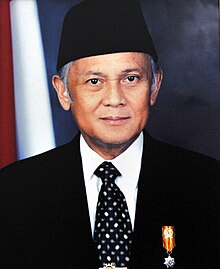
Back B.J. Habibie Afrikaans يوسف حبيبي Arabic يوسف حبيبى ARZ Jusuf Habibie AST Buharuddin Yusif Həbibi Azerbaijani B.J. Habibie BAN Бухарудзін Юсуф Хабібі Byelorussian Бахарудын Юсуф Габібі BE-X-OLD B.J. Habibie BJN ইউসুফ হাবিবি Bengali/Bangla
B. J. Habibie | |
|---|---|
 Official portrait, 1998 | |
| 3rd President of Indonesia | |
| In office 21 May 1998 – 20 October 1999 | |
| Vice President | Vacant |
| Preceded by | Suharto |
| Succeeded by | Abdurrahman Wahid |
| 7th Vice President of Indonesia | |
| In office 11 March 1998 – 21 May 1998 | |
| President | Suharto |
| Preceded by | Try Sutrisno |
| Succeeded by | Megawati Sukarnoputri (1999) |
| 4th State Minister of Research and Technology | |
| In office 29 March 1978 – 11 March 1998 | |
| President | Suharto |
| Preceded by | Sumitro Djojohadikusumo |
| Succeeded by | Rahardi Ramelan |
| Personal details | |
| Born | Bacharuddin Jusuf Habibie 25 June 1936 Parepare, Dutch East Indies |
| Died | 11 September 2019 (aged 83) Jakarta, Indonesia |
| Resting place | Kalibata Heroes' Cemetery |
| Political party | Golkar |
| Height | 162 cm (5 ft 4 in)[1] |
| Spouse | |
| Children |
|
| Parents |
|
| Relatives | Junus Effendi Habibie (brother) |
| Education | Gouvernments Middlebare School te Bandoeng |
| Alma mater |
|
| Occupation |
|
| Signature |  |
| Nicknames |
|
Bacharuddin Jusuf Habibie (Indonesian: [baxaˈrudːin ˈjusuf haˈbibi] ⓘ; 25 June 1936 – 11 September 2019) was an Indonesian politician, engineer and scientist who served as the third president of Indonesia from 1998 to 1999. Less than three months after his inauguration as the seventh vice president in March 1998, he succeeded Suharto, who resigned after 32 years in office, thereby being the only vice president to assume the presidency in such a manner. Originating from Sulawesi with Bugis-Gorontalese and Javanese ancestry,[2][3][4] his presidency was seen as a landmark and transition to the Reform era.
Upon becoming president, he liberalized Indonesia's press and political party laws; ended Indonesian occupation of East Timor, which led to that country's independence; and held an early democratic election three years sooner than scheduled, which resulted in the end of his presidency. His 517-day presidency and 71-day vice presidency were each the shortest in Indonesian history. Before entering government, Habibie contributed to the making of Indonesia's first domestic airplane, the IPTN N-250. As a result, he was granted the title "Father of Technology."[5]
- ^ Romi, J (24 November 2020) [11 May 2020]. Hendra (ed.). "Penasaran Tidak, Berapa Sih Tinggi Badan Semua Presiden Indonesia" [Are You Curious, How Tall Are All the Presidents of Indonesia]. BertuahPos (in Indonesian). Archived from the original on 12 August 2020. Retrieved 6 February 2024.
- ^ Habibie, B. J., et al. "BJ Habibie." Children 1000.1962 (2010).
- ^ "Mengenang B.J Habibie: Fokus agar Usil Tetap Genius (1)". Jawa Pos. Jawa Pos. 9 November 2019. Retrieved 29 March 2022.
- ^ "BJ Habibie, Si Jenius Indonesia dari Sulawesi". Ministry of Education, Culture, Research, and Technology. 3 May 2019. Retrieved 16 May 2024.
- ^ "Daftar Julukan 6 Presiden RI, Apa Julukan Jokowi? Halaman all". 18 April 2022.